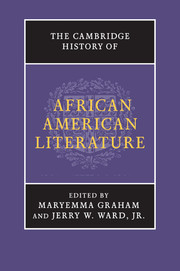Book contents
- Frontmatter
- Introduction
- PART I AFRICAN AMERICAN LITERATURE FROM ITS ORIGINS TO THE TWENTIETH CENTURY
- PART II AFRICAN AMERICAN LITERATURE IN THE TWENTIETH CENTURY
- 12 Foundations of African American modernism, 1910–1950
- 13 The New Negro Movement and the politics of art
- 14 African American literature and the Great Depression
- 15 Weaving jagged words: the black Left, 1930s–1940s
- 16 Writing the American story, 1945–1952
- 17 Geographies of the modern: writing beyond borders and boundaries
- 18 African American literature by writers of Caribbean descent
- 19 Reform and revolution, 1965–1976: the Black Aesthetic at work
- 20 History as fact and fiction
- 21 Redefining the art of poetry
- 22 Cultural resistance and avant-garde aesthetics: African American poetry from 1970 to the present
- 23 New frontiers, cross-currents and convergences: emerging cultural paradigms
- PART III AFRICAN AMERICAN LITERATURE AS ACADEMIC AND CULTURAL CAPITAL
- Bibliography
- Index
- References
21 - Redefining the art of poetry
from PART II - AFRICAN AMERICAN LITERATURE IN THE TWENTIETH CENTURY
Published online by Cambridge University Press: 28 May 2011
- Frontmatter
- Introduction
- PART I AFRICAN AMERICAN LITERATURE FROM ITS ORIGINS TO THE TWENTIETH CENTURY
- PART II AFRICAN AMERICAN LITERATURE IN THE TWENTIETH CENTURY
- 12 Foundations of African American modernism, 1910–1950
- 13 The New Negro Movement and the politics of art
- 14 African American literature and the Great Depression
- 15 Weaving jagged words: the black Left, 1930s–1940s
- 16 Writing the American story, 1945–1952
- 17 Geographies of the modern: writing beyond borders and boundaries
- 18 African American literature by writers of Caribbean descent
- 19 Reform and revolution, 1965–1976: the Black Aesthetic at work
- 20 History as fact and fiction
- 21 Redefining the art of poetry
- 22 Cultural resistance and avant-garde aesthetics: African American poetry from 1970 to the present
- 23 New frontiers, cross-currents and convergences: emerging cultural paradigms
- PART III AFRICAN AMERICAN LITERATURE AS ACADEMIC AND CULTURAL CAPITAL
- Bibliography
- Index
- References
Summary
In June 1926 W. E. B. Du Bois and Langston Hughes addressed two different audiences in two different venues on the subject of Art, especially the relationship of Art to Race. In his lecture, “The Criteria of Negro Art,” Du Bois, speaking to members of the NAACP, defined the terms by which he expected Negro American art production to further the organization's radical, reformist sociopolitical goals. “Beauty,” said Du Bois, “[must] set the world right.” In other words, Art is Beauty, but Beauty is contingent – the conditions under which Beauty may be appreciated must be created. Art must first be artful. In his 1926 essay, “The Negro Artist and the Racial Mountain,” which appeared in The Nation, Hughes attempted to redefine the position of the artist in relation to his art, his identity, and his community. Hughes decried the debased condition of American audiences, black and white, who routinely applied racial criteria to affirm or dismiss the artistic accomplishments of Negro artists – a condition he believed was certain to negatively affect the artistic values of the artists themselves. Hughes's famous declaration is equal parts manifesto and exasperation:
We know we are beautiful. And ugly too. The tom-tom cries and the tom-tom laughs. If colored people are pleased we are glad. If they are not, their displeasure doesn't matter either. We build our temples for tomorrow, strong as we know how, and we stand on top of the mountain, free within ourselves.
- Type
- Chapter
- Information
- The Cambridge History of African American Literature , pp. 497 - 531Publisher: Cambridge University PressPrint publication year: 2011



